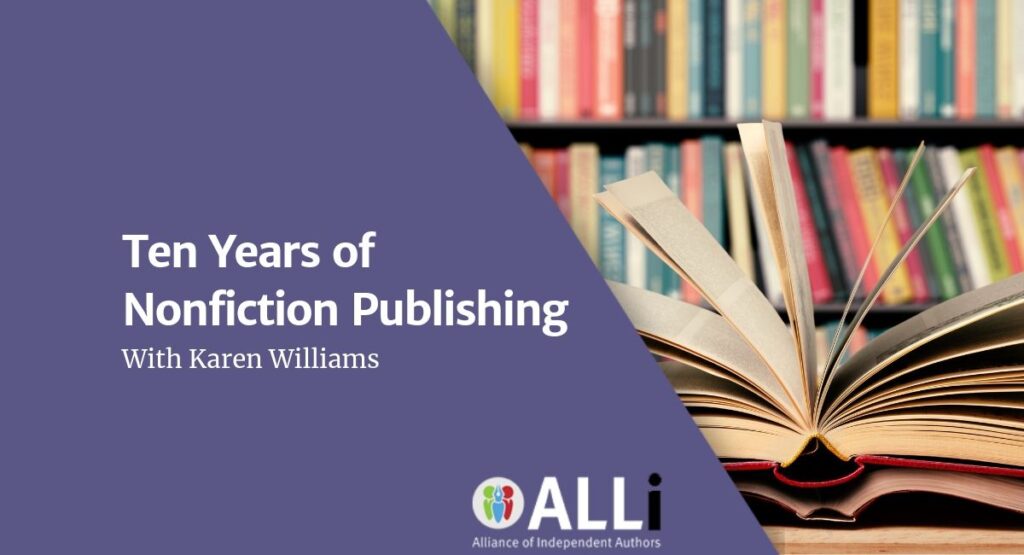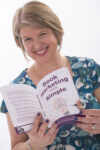 There's one thing we can all be assured of in our industry, and that's that there will always be changes. Whether it's to platforms, algorithms, or technology, change shows no signs of slowing down. ALLI Partner Member Karen Williams from The Book Mentor is here to talk about what's happened in ten years of nonfiction publishing.
There's one thing we can all be assured of in our industry, and that's that there will always be changes. Whether it's to platforms, algorithms, or technology, change shows no signs of slowing down. ALLI Partner Member Karen Williams from The Book Mentor is here to talk about what's happened in ten years of nonfiction publishing.
In August 2009, I naively, or perhaps bravely, made a declaration that I was going to write a book. When I started out on this journey, very few business owners were doing it. It was the exception rather than the norm, and usually only an option for those already well known within their industry.
But in ten years of nonfiction publishing, things have changed. There are a lot more nonfiction authors in the business community. More entrepreneurs than ever before have realised the benefit of becoming a published author, and how it can raise their credibility and expert status. It’s easier than ever to write and publish a book, and technology has facilitated this growth. But just because it’s easier doesn’t mean that everyone is successful.
 I was recently asked by my business mentor what has changed for authors in the last ten years of nonfiction publishing, which prompted this blog post. As the author of five published books (with a sixth on the way) and having mentored hundreds of other non-fiction business authors, these are three of the biggest changes that I’ve seen take place.
I was recently asked by my business mentor what has changed for authors in the last ten years of nonfiction publishing, which prompted this blog post. As the author of five published books (with a sixth on the way) and having mentored hundreds of other non-fiction business authors, these are three of the biggest changes that I’ve seen take place.
The publishing industry
When I published my first book in 2011, traditional publishing was most people’s method of choice. Self-publishing was in existence, but many viewed it as vanity publishing. With no selection process, it was also an expensive way to publish a book. Although a number of now well-known books started off being self-published, it was successful only for a select few.
Partnership and hybrid publishing for nonfiction authors
Partnership or hybrid publishing was in its infancy, but it wasn’t a particularly well-known option. Few organisations offered this service.
In the last ten years of nonfiction publishing, there’s been an increase in the number of professional self-publishing and partnership options to meet the demand. Although many still crave the kudos of being sought and signed by a traditional publishing house, it’s harder than ever to get a deal. If you do avoid the slush pile, royalties can be low, and it takes time to get published. As a business owner, you may lose control over your intellectual property, copyright, and the final content in your book.
Self-publishing and partnership options give an author more control over their book. If you want to use your content for a course or programme, it’s important to keep control of your intellectual property. If you don’t want someone else to get in first, you can get your book published quickly and also retain higher royalties. But like any service, there is a cost to publishing in this way. You need a budget for mentoring, editing, proofreading, design, publishing and marketing.
The Downside of Choice
In my opinion, the rise in self and partnership publishing is a double-edged sword. Although it gives people more choice than ever before, I see too many mediocre books on sale where authors have taken shortcuts to publication. They have not enlisted the right help for their book to be credible and professional. If you’re writing a book to build your business, it has to be good quality. If your book isn't good enough, you'll damage your business and your brand rather than enhance it.
There are also publishing technology trends to be considered. The number of e-Book platforms has increased, with Kindle, Nook, Kobo and Apple iBooks being the platforms of choice. And the number of people listening to audio books increases year on year, as our busy lives mean we seek different ways to learn and absorb stimulating information.
And where do you go to buy the books that intrigue you? Do you pop out to your local bookshop or do you go to an online store, such as Amazon, where you can order with one click, with delivery the next day or immediately onto your e-book device or via audio? If you’re following these trends, then your readers are likely to follow these too.
Technology and its effect on entrepreneurship
Evolving technology has also impacted book promotion. As entrepreneurs ‒ or perhaps authorpreneurs ‒ we need to embrace and leverage technology.
When I wrote my first book, I had just started using social media platforms. I joined Facebook in 2009, but the emphasis back then was on the social element. Very few people were using it to build their business. LinkedIn has risen in popularity and Twitter is another key tool that is now used for business. We’ve also seen the launch of hundreds of other platforms like Instagram and YouTube and the rise and demise of Google Plus.
The main difference now is that the savviest entrepreneurs are embracing these tools for business, although these days they may need to go down the advertising route to get heard. It’s key to have a presence and use these as platforms to promote your business and book alongside traditional relationship building.
Technology has also impacted on what we can do online, and the deliverability of an author’s message. E-commerce capabilities, website advancement, membership sites, and the development of email marketing systems have all advanced.
You have to keep abreast of changes and use these platforms to find your ideal reader and build relationships with your followers and fans. Or you have to engage someone to help you.
It’s harder than ever to get heard
Most nonfiction authors write their book to reach more people within their niche areas, or at least that’s what I’d advise them to do. But as more people than ever are writing and publishing books, if you want to reach more people, then you have to work hard to get your message heard. It’s certainly not enough to put your book on Amazon and hope that someone is going to find it.
The most successful authors have a great marketing plan for their book. Not only do they look at new and innovative ways to get book sales, they start with the end in mind. Before they start to write their book, they consider what they want their book to do for their business, and they ensure that the content and call to action help them to do this.
They also write a book for their ideal reader that solves a problem. They establish themselves as an expert. They share their story, include real-life examples, and tell the reader what they could do next. Success is not all about sales: your book is a credibility builder and a business card, albeit an expensive one.
When you’re savvy, your book can lead to other opportunities that bring in an income, such as sponsorship arrangements, bulk orders of your book (rather than individual sales), membership sites and online programmes, promotion of one-to-one group services, running retreats and workshops, speaking opportunities, entering and winning awards, all with the end objective of putting you and your business on the map.
What about the next ten years of nonfiction publishing?
I believe a book gives a business author a brilliant foundation on which they can share their knowledge, expertise and story. When they lead their readers and clients on a journey, they can achieve the transformation that is desired. What will the next ten years of nonfiction publishing hold?
Karen Williams from The Book Mentor tells us about the changes she's seen for nonfiction authors over the last decade. #amwriting #indieauthor #selfpublishing #IARTG Share on XOVER TO YOU
There have been a lot of changes in the last ten years of nonfiction publishing, and the industry continues to evolve. If there’s anything you think I’ve missed, I’d love to hear about it.





Thank you for sharing your advice and insight…it’s food for thought.